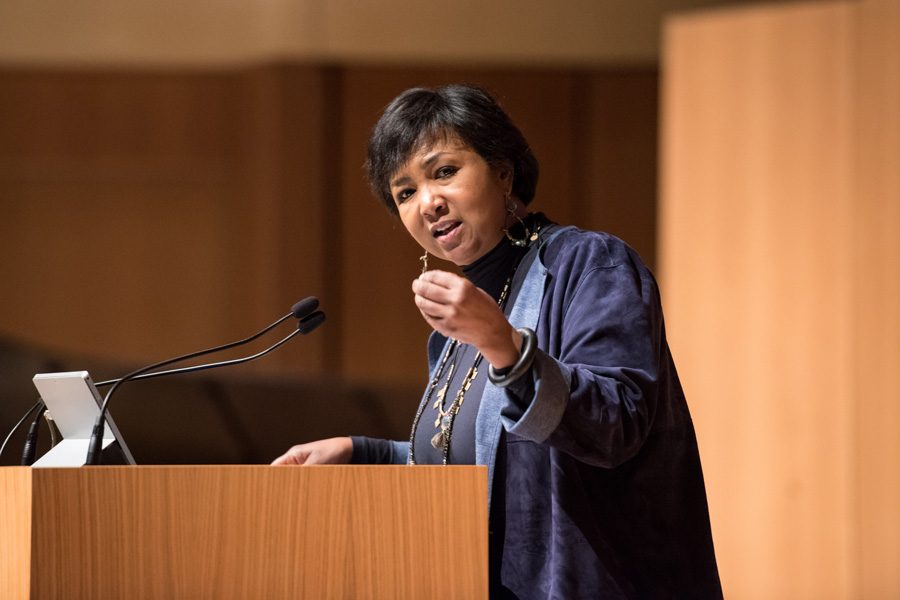First African-American woman astronaut discusses convergence of civil rights, space
Colin Boyle/Daily Senior Staffer
Astronaut Mae Jemison speaks about the need for diversity in advancing social issues and scientific exploration. Jemison was the first African-American woman in space and the keynote speaker of Northwestern’s Martin Luther King, Jr. commemorative programming.
January 24, 2017
Mae Jemison, the first female African-American astronaut, urged in a speech at Northwestern on Monday that diverse perspectives are necessary to advance not only social progress, but also scientific discovery.
Jemison, the keynote speaker for NU’s two-week Martin Luther King, Jr. celebration, spoke to more than 500 people Monday in Pick-Staiger Concert Hall about the intersection of U.S. space exploration programs and civil rights movements in the 1960s, as well as the importance of diversity in STEM fields.
“The question that is central to celebrating the life and legacy of Martin Luther King, Jr., is, ‘What are you going to do with your place at the table?’” she said. “It’s about really using our position, what we’ve learned, our life experiences, and bringing them to create positive solutions.”
A committee of staff, students and alumni selected Jemison as the keynote speaker because of her role as a pioneer in the STEM fields, said Theresa Bratanch, manager in the Office of Institutional Diversity and Inclusion. MLK Day programming started Jan. 13 and runs until Jan. 28.
Jemison made history in 1992 when she flew aboard the Endeavor, becoming the first African-American woman in space. Prior to her expedition, she double majored at Stanford University in chemical engineering and African and Afro-American studies and attended Weill Cornell Medicine.
In her speech, Jemison discussed how growing up in the progressive political climate of Chicago’s South Side in the 1960s helped inspire her to achieve her goals.
“Every day we were changing things,” Jemison said. “The ’60s were the time when we were breaking speed records. We were demanding these rights. I grew up during these times with unlimited potential.”
In her presentation, Jemison traced the coinciding origins of NASA and the Civil Rights Act of 1964. She also discussed the many people of color who pioneered space exploration, referencing the recently-released movie “Hidden Figures,” which tells the story of three black women who played a critical role in the development of the U.S. space program.
Jemison emphasized that STEM field researchers’ work is often informed by their life experiences. In order to best develop future technology, diverse perspectives are necessary, she added.
“The space program has had a very interesting impact because everybody’s looked up at the stars in one way or another,” Jemison said. “Perhaps, it can be one of the most unifying things that can help us think about ourselves as earthlings.”
After the speech, Dr. Darlene Clark Hine, the Board of Trustees Professor of African American Studies, conducted a short Q&A with Jemison.
Jemison said barriers to the inclusion of minorities and women in STEM fields is systemic, not reflective of the individuals seeking to break into those areas.
“The biggest hurdles are with the gatekeepers,” she said. “And society that tells girls they can’t get involved in things.”
Weinberg senior Elleana Shepperd attended the speech and said it made her think about her place in the world after college.
“Now I’m thinking about my place at the table in the context of me being a graduating senior in the spring and going out in the world,” she told The Daily. “And as a woman of color, how I envision myself taking on a role.”
Email: [email protected]
Twitter: @amandasvachula


